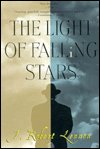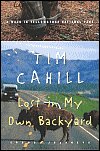Uh oh! I've been memed by a fire ant I must say, it's nice to be included. To any of you who are new to my blog, welcome. Hope you will find food for your brain and maybe a chuckle or two. If not, then I'll certainly try again.
Here are the questions Eric forwarded and my answers...
1. You're stuck inside Fahrenheit 451. Which book do you want to be? "The Name of the Rose" by Umberto Eco which includes a couple of burnings, though not of books. Incidentally, if you permute the letters of Mr. Eco's first and last name in just the right way you get the anagram "Rectum Oboe." Not sure I'd want to attend that recital.
2. Have you ever had a crush on a fictional character? No, though given my track record at crushes it probably would have worked out better if I had.
3. The last book you bought was...? "Waxwings" by Jonathan Raban. I'm a fan. Check out his "Bad Land" and "Hunting Mr. Heartbreak" and especially "Passage to Juneau."
4. The last book you read was...? Perfect Madness: Motherhood in the Age of Anxiety, which was not as interesting as I had hoped. Yes, pretty much every woman who saw me reading the book asked me why. Read this blog long enough and you'll probably find out.
5. What are you currently reading? The Confusion by Neal Stephenson. Second in his Baroque Cycle, which I blogged on a few days ago. Also The Noonday Demon: An Atlas of Depression by Andrew Solomon. Excellent, and heartbreaking at times.
6. Five books you would take to a desert island...
I have been to Aruba which is like a desert island. Here are the books I would take if I ever go back...
6.1. The Gospel of John, because I love it and you get 65 other really great books with it.
6.2. Blue Like Jazz, by Donald Miller for the quality of the writing and the message.
6.3. Lonesome Dove by Larry McMurtry because it's long and good and packed with great insights about human beings. If that wasn't available I'd take A Prayer for Owen Meany by John Irving for the same reasons.
6.4. In the Name of Jesus by Henri Nouwen. The best book on leadership from a Christian perspective, and you can read it cover to cover in about 60 minutes. Of course if my desert island was also deserted I guess there wouldn't be anyone else there to be in community with, which would make it impossible to apply one of Nouwen's main points. Oh well, I'd still want this one.
6.5. Can this count as one? The Lord of The Rings, all three. I guess you can buy it in a single bound volume now so, yes, let's go with this one. The last line of the third book is maybe my favorite ending of any book; so good it's worth reading the entire trilogy to get there. I'm not ashamed to say I wept for 15 minutes the first time I finished.
Who are you passing this stick on to and why? I'm passing this stick to my old friend and current colleague (boss, to be exact) Will at fishdance waves. I think I'll also see if I can scare up Megan at quiethere.com -- though I'll have to find a way to let her know since I don't think she's aware of the existence of my blog yet.
Thank you to Eric for the shout out, for graciously instructing me in meme response, and for introducing me around blogdom.
Peace.
2005-04-30
2005-04-29
sucess?
Thanks to Eric for this post. He's got an interesting and wide ranging blog which you should check out.
Anyway, he commented on my post from two days ago re:the fallacy of numbers as a gauge for success in the church. He asked me two excellent questions...
1) Should churches or ministries attempt to measure "success"?
2) If so, what do you suggest is a better quantifier?
I promised him an attempt at a coherent answer in today's blog. And here it is. An attempt. Perhaps you should look at it as more of an invitation.
I'm answering w.r.t. churches and the programs they implement. I'm not answering w.r.t. parachurch ministries, but that doesn't mean I don't have strong opinions about those too.
Question the first:
Should churches or ministries attempt to measure success?
You might think that we should define success first. The definition of success varies widely however and is for the most part a function of what is measured. Churches should attempt to gauge success, but not if size (in terms of numbers of participants or dollars) is the exclusive or even primary measure. Now it's not that I have anything against numbers. And truth be told, God is concerned with a number, and that number is 'all.' God is concerned with all people at all times and in all places. The number of people who attend a given church can indeed be one indicator of health. But size of congregation is an indicator of health if and only if (I'm a mathemetician by training, had to throw that in), other more important indicators are present. Why? Because a large church is not necessarily a successful church, and a small church is not necessarily a failure. In fact, it could be and often is just the opposite.
Question the second:
If so, suggest better quantifiers...
Here are a couple to start with... a full answer would require a book, for more information on this book, see my post dated 4/23/2005.
#1. Is the overriding culture of our church centered around a preference for others rather than a preference for self? That is, do people take to heart and act on the many and various scriptures that urge us toward things like "do nothing out of selfish ambition or vain conceit but in humility consider others better than yourselves", or "love one another as I have loved you." But it's hard to define and quantify such things! So what? Numbers are by definition quantifiable, and obvious as a means for measurement; that doesn't make them accurate. I'm a statisitician and a former advertising research guy. I can make numbers say anything I want. It is harder to quantify the preference for others vs. preference for self in a church. But it is not impossible, and perhaps in the end you'll be able to better qualify it (identify qualities) than quantify (create an index of "other preference").
For example, at my own church people come and visit once and we never see them again. Why? Because our church is not very good at the above. Does that mean we should start measuring repeat visits? Not necessarily. It means we should start helping and encouraging our congregation to grapple with what it means to prefer others to themselves, to give themselves away to others in love. And when we do this some people will leave, you can take that to the bank. But we will be getting healthier as a church despite the shrinkage.
#2. Does our church practice the discipline of forgiveness? Jesus hardly ever sounds as harsh as he does when addressing unforgiveness. "If you forgive the sins of any, they are forgiven. If you retain them they are retained." and "If you do not forgive others when they sin against you, then your heavenly Father will not forgive you." Uh oh.
Most of the Christians I've ministered to don't know that things like this are even in the scriptures. But there they are. If a church calls itself Christian, it ought to at least make an effort at attending to what Jesus said. And what Jesus was most insistent on was forgiveness. The church is to be a sign of forgiveness to the world. So how well is my church doing in the area of forgiveness? Are we a community that practices saying the hard words: "I forgive you." The faith communities I've been involved in have been better at judgment than forgiveness, and perhaps this is always going to be the case because we are human. But I so rarely see the effort at forgiveness, and that alone would make a difference. Again, hard to quantify this, but we know that all people do and say things every day that require forgiveness. I'm not talking about heinous crimes here, but about run of the mill ickyness: insults, gossip, selfishness, clumsiness, foolishness. Jesus told us to be forgivers. Are we?
Maybe tomorrow I'll suggest a few more measures. But my purspose in the "much-ness and many-ness" post and also in this one is to spur the few who may read this to think of novel ways of gauging church success (I've used the term 'health' interchangable with 'success' in this post on purpose by the way). Ways that don't depend on size of the ministry.
And thanks Eric--for reading, and for the critical thinking.
Anyway, he commented on my post from two days ago re:the fallacy of numbers as a gauge for success in the church. He asked me two excellent questions...
1) Should churches or ministries attempt to measure "success"?
2) If so, what do you suggest is a better quantifier?
I promised him an attempt at a coherent answer in today's blog. And here it is. An attempt. Perhaps you should look at it as more of an invitation.
I'm answering w.r.t. churches and the programs they implement. I'm not answering w.r.t. parachurch ministries, but that doesn't mean I don't have strong opinions about those too.
Question the first:
Should churches or ministries attempt to measure success?
You might think that we should define success first. The definition of success varies widely however and is for the most part a function of what is measured. Churches should attempt to gauge success, but not if size (in terms of numbers of participants or dollars) is the exclusive or even primary measure. Now it's not that I have anything against numbers. And truth be told, God is concerned with a number, and that number is 'all.' God is concerned with all people at all times and in all places. The number of people who attend a given church can indeed be one indicator of health. But size of congregation is an indicator of health if and only if (I'm a mathemetician by training, had to throw that in), other more important indicators are present. Why? Because a large church is not necessarily a successful church, and a small church is not necessarily a failure. In fact, it could be and often is just the opposite.
Question the second:
If so, suggest better quantifiers...
Here are a couple to start with... a full answer would require a book, for more information on this book, see my post dated 4/23/2005.
#1. Is the overriding culture of our church centered around a preference for others rather than a preference for self? That is, do people take to heart and act on the many and various scriptures that urge us toward things like "do nothing out of selfish ambition or vain conceit but in humility consider others better than yourselves", or "love one another as I have loved you." But it's hard to define and quantify such things! So what? Numbers are by definition quantifiable, and obvious as a means for measurement; that doesn't make them accurate. I'm a statisitician and a former advertising research guy. I can make numbers say anything I want. It is harder to quantify the preference for others vs. preference for self in a church. But it is not impossible, and perhaps in the end you'll be able to better qualify it (identify qualities) than quantify (create an index of "other preference").
For example, at my own church people come and visit once and we never see them again. Why? Because our church is not very good at the above. Does that mean we should start measuring repeat visits? Not necessarily. It means we should start helping and encouraging our congregation to grapple with what it means to prefer others to themselves, to give themselves away to others in love. And when we do this some people will leave, you can take that to the bank. But we will be getting healthier as a church despite the shrinkage.
#2. Does our church practice the discipline of forgiveness? Jesus hardly ever sounds as harsh as he does when addressing unforgiveness. "If you forgive the sins of any, they are forgiven. If you retain them they are retained." and "If you do not forgive others when they sin against you, then your heavenly Father will not forgive you." Uh oh.
Most of the Christians I've ministered to don't know that things like this are even in the scriptures. But there they are. If a church calls itself Christian, it ought to at least make an effort at attending to what Jesus said. And what Jesus was most insistent on was forgiveness. The church is to be a sign of forgiveness to the world. So how well is my church doing in the area of forgiveness? Are we a community that practices saying the hard words: "I forgive you." The faith communities I've been involved in have been better at judgment than forgiveness, and perhaps this is always going to be the case because we are human. But I so rarely see the effort at forgiveness, and that alone would make a difference. Again, hard to quantify this, but we know that all people do and say things every day that require forgiveness. I'm not talking about heinous crimes here, but about run of the mill ickyness: insults, gossip, selfishness, clumsiness, foolishness. Jesus told us to be forgivers. Are we?
Maybe tomorrow I'll suggest a few more measures. But my purspose in the "much-ness and many-ness" post and also in this one is to spur the few who may read this to think of novel ways of gauging church success (I've used the term 'health' interchangable with 'success' in this post on purpose by the way). Ways that don't depend on size of the ministry.
And thanks Eric--for reading, and for the critical thinking.
2005-04-28
i'm going. maybe not.
My writer's group meets every Thursday at a Border's about 30 minutes from my house. They meet every Thursday. Every Thursday at 7pm, they meet. I've no excuse for not knowing the time and the day. I never forget that the group meets every Thursday at 7pm at the Borders about 30 minutes from my house. I know the route so well I can just about drive it with my eyes closed, though the traffic is always heavy at 6:30pm and driving that way would be a bad idea.
So every Thursday at 6:30pm I have a decision to make. I'm going. Or, maybe not. Today is Thursday. A glance at my notebook's deskptop clock tells me it is 4:25pm. The piece I'm to take to the group tonight is crap. I liked it until this morning, because today is Thursday and the writer's group meets at 7pm. I've read the thing and revised it three times today and every time it gets worse, so I am having second thoughts about writer's group tonight. At 6:30pm I may get into my car and drive the 30 minutes to the Borders bookstore. And then again, I may not.
The people in the group are very nice. They always find a way to say what my writing needs and make it sound like a compliment. The really seem to like what I bring most of the time. I usually leave there felling relatively good about my stuff. Even if it needs work, I feel encouraged. It's only beforehand that I have second thoughts, like I'm having now. Because the piece I've written is crap.
It doesn't hang together. There's no real point to it. There's a couple of adverbs, which is a couple too many. Yesterday it made so much sense. It sounded beautiful and cohesive. Today it's crap. I've changed it a little, tweaked it here and there, and have only increased my conviction that the piece is not worth the ink it would take to print it out. So that I can take it to the group, for which I will need to leave the house in two hours. Because they'll be meeting at 7pm at a Borders about 30 minutes from my house.
So every Thursday at 6:30pm I have a decision to make. I'm going. Or, maybe not. Today is Thursday. A glance at my notebook's deskptop clock tells me it is 4:25pm. The piece I'm to take to the group tonight is crap. I liked it until this morning, because today is Thursday and the writer's group meets at 7pm. I've read the thing and revised it three times today and every time it gets worse, so I am having second thoughts about writer's group tonight. At 6:30pm I may get into my car and drive the 30 minutes to the Borders bookstore. And then again, I may not.
The people in the group are very nice. They always find a way to say what my writing needs and make it sound like a compliment. The really seem to like what I bring most of the time. I usually leave there felling relatively good about my stuff. Even if it needs work, I feel encouraged. It's only beforehand that I have second thoughts, like I'm having now. Because the piece I've written is crap.
It doesn't hang together. There's no real point to it. There's a couple of adverbs, which is a couple too many. Yesterday it made so much sense. It sounded beautiful and cohesive. Today it's crap. I've changed it a little, tweaked it here and there, and have only increased my conviction that the piece is not worth the ink it would take to print it out. So that I can take it to the group, for which I will need to leave the house in two hours. Because they'll be meeting at 7pm at a Borders about 30 minutes from my house.
2005-04-27
much-ness and many-ness
Forget the homosexual issue, which is the ostensible topic of the story here. The bee that has taken up residence in my bonnet is something else entirely. If you listen to the audio, you'll hear a story about a particular Episcopal church in Overland Park KS leaving its denomination over the ordination of an openly gay bishop two years ago. About two thirds of the way through the story, there is a sound bite from an interview with a member of the church's vestry. Here's a quote...
"There are seventy seven million anglicans in the world. In the Epsicopal church it's two million. In 1960 the Episcopal church was six million members, today it's two. By the time this thing's done it'll be one. Our church has tripled in the last seven or eight years. Who's God blessing?"
Now, the man who said these words is probably a faithful man, perhaps even a nice man who I would enjoy spending time with. And I'm not really surprised at the completely misguided and bogus theology he betrays with his words because he is an American Evangelical Christian. And in America God's blessing is almost uniformly perceived to be based on numbers. The implication is clear-- God is blessing his church and their stance on__insert theological bugaboo of the week here__ because their numbers are going up.
Doesn't make any difference whether his church is good news (the meaning of "gospel," and "evangelism") to its community, whether the church is doing anything to contribute to the fullness of life of its congregation and particularly those on the outside. Even if the church is doing none of those things, God must be blessing it because attendance has grown.
Those of us who have the temerity to call ourselves Christians need to learn that numbers have almost nothing to do with God's blessing. This gentleman's church may indeed be experiencing a 'blessing' from God and it may be growing, but the assumption of an automatic link beween the two is a bad assumption indeed.
As I said, I don't blame the guy for thinking the way he does, he's probably had the numbers/blessing connection banged into his head so much over the years that it's simply automatic, top of mind. But if success and blessing are related to numbers, then Jesus was a miserable failure, as he left behind a tiny group of cowering followers who "said nothing to anyone because they were afraid." And I suppose every small church in this big successful country of ours is unblessed as well.
"There are seventy seven million anglicans in the world. In the Epsicopal church it's two million. In 1960 the Episcopal church was six million members, today it's two. By the time this thing's done it'll be one. Our church has tripled in the last seven or eight years. Who's God blessing?"
Now, the man who said these words is probably a faithful man, perhaps even a nice man who I would enjoy spending time with. And I'm not really surprised at the completely misguided and bogus theology he betrays with his words because he is an American Evangelical Christian. And in America God's blessing is almost uniformly perceived to be based on numbers. The implication is clear-- God is blessing his church and their stance on__insert theological bugaboo of the week here__ because their numbers are going up.
Doesn't make any difference whether his church is good news (the meaning of "gospel," and "evangelism") to its community, whether the church is doing anything to contribute to the fullness of life of its congregation and particularly those on the outside. Even if the church is doing none of those things, God must be blessing it because attendance has grown.
Those of us who have the temerity to call ourselves Christians need to learn that numbers have almost nothing to do with God's blessing. This gentleman's church may indeed be experiencing a 'blessing' from God and it may be growing, but the assumption of an automatic link beween the two is a bad assumption indeed.
As I said, I don't blame the guy for thinking the way he does, he's probably had the numbers/blessing connection banged into his head so much over the years that it's simply automatic, top of mind. But if success and blessing are related to numbers, then Jesus was a miserable failure, as he left behind a tiny group of cowering followers who "said nothing to anyone because they were afraid." And I suppose every small church in this big successful country of ours is unblessed as well.
2005-04-26
i'm sorry, this is disgusting
I like hamburgers, they're even better with cheese. Certain types of junk food really make me smile. Take Nacho Cheese Doritos for example. Yum. And Dunkin' Donuts (I'm very sorry but Krispy Kreme doesn't get it done, and their stock is down too), especially the sour cream donut...glazy, donutty goodness.
But now there's the Monster Thickburger! Ugh. I'm getting sick just looking at the thing. What are they thinking? Have they not seen "Supersize Me"? McDonalds eliminated their supersize offerings six months after the film came out. Of course the menu adjustment had NOTHING to do with the movie. Okay.
The Monster Thickburger, according to this story on NPR has already contributed to a 7% increase in sales at Hardy's. And they sell twice as many milkshakes now that they have doubled(!!) the fat content. But me no buts about how most people don't eat at these places more than once in a while. Look around. We're fat! Dangerously so. And it's getting worse. The fast food slingers may only be symptomatic of something else, and they have as much right to make a buck as anyone else; but a symptom they are, and of a very real problem.
The isidious thing about these new artery cement options is that they will sell; they will probably be incredibly popular. And what's popular, what sells well, is justified. But I wonder...are we really okay with the skyrocketing levels of obesity and the attendant health consequences? Okay enough that we are eating ourselves into an early grave? What is driving this madness?
But now there's the Monster Thickburger! Ugh. I'm getting sick just looking at the thing. What are they thinking? Have they not seen "Supersize Me"? McDonalds eliminated their supersize offerings six months after the film came out. Of course the menu adjustment had NOTHING to do with the movie. Okay.
The Monster Thickburger, according to this story on NPR has already contributed to a 7% increase in sales at Hardy's. And they sell twice as many milkshakes now that they have doubled(!!) the fat content. But me no buts about how most people don't eat at these places more than once in a while. Look around. We're fat! Dangerously so. And it's getting worse. The fast food slingers may only be symptomatic of something else, and they have as much right to make a buck as anyone else; but a symptom they are, and of a very real problem.
The isidious thing about these new artery cement options is that they will sell; they will probably be incredibly popular. And what's popular, what sells well, is justified. But I wonder...are we really okay with the skyrocketing levels of obesity and the attendant health consequences? Okay enough that we are eating ourselves into an early grave? What is driving this madness?
2005-04-25
give it up for jesus
Someone actually said this at a giant Christian thingy I had the misfortune to attend last night. Though I shouldn't characterize it as mis-fortune as luck was not involved. I got in my car, drove there, and walked in under my own power. The event was held at a large local church--this should have been a red flag.
There were hundreds of people attending this thingy, mostly but not completely adolescents, and they were groovin' to a band that may have been pretty good, except that their sound tech had the instruments at about 65db and the voices at 90db; they looked like they were having a good time though.
Then, a drama, which was performed by students from large Red Flag Church's youth ministry. It wasn't bad either, except that two of the main characters' mics were turned off for the first half of it. They looked like they were haveing a good time though.
After that, they brought on The Speaker. I guess it was supposed to be some famous football player but since I don't know or care about football I wouldn't have known who it was. Football dude's wife had given birth that weekend so he cancelled and they brought in this other guy, not a football player but equally unheard of by me. The second string speaker talked about the grace of God, which was sort of the theme for the night, as well as the theme of my life, so you would think I would be interested.
He yelled, he screamed--I'm not kidding. He talked about how he met Jeremy Camp. I must admit I was impressed, though I kept thinking, "who is Jeremy Camp?" My lack of knowledge about this must reflect my feelings about Christian music. Everyone else knew exactly who JC was (is). I wanted to say, "I know Sam Getz!" but everyone else, including the speaker, was screaming so much that I didn't think they would notice, or care if they did.
SO then, Screaming Speaker dude gave the "altar call." AGGGGGGHHHHHHHH!!!!! And he said something in there about how if you made the "decision" to "accept" Jesus into your heart that it would behoove you to come up to the altar because the Word of God says "if you confess him publicly, Jesus will confess you before the heavenly Father." After saying this he paused just long enough for all of us to consider the inverse of this statement and its implications.
He put down the microphone and asked the band to come up. They returned to the stage and sang a song called Breathe, by Marie Barnett, which I really like. And now I could hear the instruments as well as the vocals. The sound tech must have realized this as well, so he quickly reset the instruments to their previous and nearly inaudible levels. When they had finished the song, the highly photogenic female worship leader with the rather tight black blouse and (it seemed) teary eyes, put the microphone to her lips and, her voice full of drama and import, said, "Let's give it up for Jesus."
I gave it up alright. My stomach was turning and I didn't want to throw up all over the pre-pubers and adolescents who were streaming forward in fear that God would not "acknowledge" them if they didn't (okay, maybe they weren't fearing that but I still didn't want to vomit on them). So I left.
Most of (the two of) you who read this blog undoubtedly know of my moderately long career as a youth minister. I don't think I ever did anything as manipulative and (to my mind) as grace-less as what I've described above, but maybe I did and have repressed the memory. If I did, I'm sorry. I won't do it again.
So why is the church so lame? Comment if you dare.
There were hundreds of people attending this thingy, mostly but not completely adolescents, and they were groovin' to a band that may have been pretty good, except that their sound tech had the instruments at about 65db and the voices at 90db; they looked like they were having a good time though.
Then, a drama, which was performed by students from large Red Flag Church's youth ministry. It wasn't bad either, except that two of the main characters' mics were turned off for the first half of it. They looked like they were haveing a good time though.
After that, they brought on The Speaker. I guess it was supposed to be some famous football player but since I don't know or care about football I wouldn't have known who it was. Football dude's wife had given birth that weekend so he cancelled and they brought in this other guy, not a football player but equally unheard of by me. The second string speaker talked about the grace of God, which was sort of the theme for the night, as well as the theme of my life, so you would think I would be interested.
He yelled, he screamed--I'm not kidding. He talked about how he met Jeremy Camp. I must admit I was impressed, though I kept thinking, "who is Jeremy Camp?" My lack of knowledge about this must reflect my feelings about Christian music. Everyone else knew exactly who JC was (is). I wanted to say, "I know Sam Getz!" but everyone else, including the speaker, was screaming so much that I didn't think they would notice, or care if they did.
SO then, Screaming Speaker dude gave the "altar call." AGGGGGGHHHHHHHH!!!!! And he said something in there about how if you made the "decision" to "accept" Jesus into your heart that it would behoove you to come up to the altar because the Word of God says "if you confess him publicly, Jesus will confess you before the heavenly Father." After saying this he paused just long enough for all of us to consider the inverse of this statement and its implications.
He put down the microphone and asked the band to come up. They returned to the stage and sang a song called Breathe, by Marie Barnett, which I really like. And now I could hear the instruments as well as the vocals. The sound tech must have realized this as well, so he quickly reset the instruments to their previous and nearly inaudible levels. When they had finished the song, the highly photogenic female worship leader with the rather tight black blouse and (it seemed) teary eyes, put the microphone to her lips and, her voice full of drama and import, said, "Let's give it up for Jesus."
I gave it up alright. My stomach was turning and I didn't want to throw up all over the pre-pubers and adolescents who were streaming forward in fear that God would not "acknowledge" them if they didn't (okay, maybe they weren't fearing that but I still didn't want to vomit on them). So I left.
Most of (the two of) you who read this blog undoubtedly know of my moderately long career as a youth minister. I don't think I ever did anything as manipulative and (to my mind) as grace-less as what I've described above, but maybe I did and have repressed the memory. If I did, I'm sorry. I won't do it again.
So why is the church so lame? Comment if you dare.
2005-04-24
not exactly reclusive
Some of the books I read are quasi-recommended to me by a guy named Ken Myers, who is the creator and host of the Mars Hill Audio Journal. I've been a subscriber to Mars Hill for a number of years now because Mr. Myers often explores topics that I am deeply interested in. The interview he did a few years back with a writer named Neal Stephenson caught my attention, though ordinarily I would not have read Stephenson or his book, Cryptonomicon. I won't go into the book here, but I will say I liked it a lot and as I do with many authors, I sbusequently devoured Neal Stephenson's entire opus.
Stephenson has an unearned reputation as a recluse. What he actually is however, is an introvert, like me. On a web page that he constructed to stop people from incessantly bothering him, he wrote...
"When I read a novel that I really like, I feel as if I am in direct, personal communication with the author. I feel as if the author and I are on the same wavelength mentally, that we have a lot in common with each other, and that we could have an interesting conversation, or even a friendship, if the circumstances permitted it. When the novel comes to an end, I feel a certain letdown, a loss of contact. It is natural to want to recapture that feeling by reading other works by the same author, or by corresponding with him/her directly."
...which is how I almost always feel when I read any book I really like. He then went on to explain that many people who had liked his books (as I did) tried to contact him (as I had actually thought about doing), and that this is almost always a bad idea.
He reminded me of something I already knew: that introverts have vast stretches of a life of the mind that are often expressed in conversation as something like, "huh?" Introverts are always thinking but not often giving others visual cues that they are thinking. In fact, they are usually giving visual cues that suggest they are in some other place, a far away place. I've done this many times. Introverts are capable of wild feats of imagination and creativity, after which they want you, you, and especially you, to stay the hell out of their face!
Stephenson in the end, is saying something like, "please read my books and let's leave our relationship at that." Which is a good, a very good idea. And his books are great, at least I think so. I am currently reading one of them, The Confusion, which is a joining together of two related novels (they are con-fused, get it?). This book is the second in a series called the Baroque Cycle. The first of the cycle was Quicksilver. The baroque cycle itself is actually (not exactly) a prequel to Cryptonomicon, the book that interested me in Stephenson and his work. It follows the ancestors of the characters from Crypto, starting way back in the middle ages. It is, like Crypto, unbelievably well constructed and researched and written. The plot is admittedly hard to figure out, but it is so interesting and multileveled that it could only have come from the mind of a introvert.
If you've had any contact with NS's opus, I'd love to hear your thoughts on him via the comments button.
Stephenson has an unearned reputation as a recluse. What he actually is however, is an introvert, like me. On a web page that he constructed to stop people from incessantly bothering him, he wrote...
"When I read a novel that I really like, I feel as if I am in direct, personal communication with the author. I feel as if the author and I are on the same wavelength mentally, that we have a lot in common with each other, and that we could have an interesting conversation, or even a friendship, if the circumstances permitted it. When the novel comes to an end, I feel a certain letdown, a loss of contact. It is natural to want to recapture that feeling by reading other works by the same author, or by corresponding with him/her directly."
...which is how I almost always feel when I read any book I really like. He then went on to explain that many people who had liked his books (as I did) tried to contact him (as I had actually thought about doing), and that this is almost always a bad idea.
He reminded me of something I already knew: that introverts have vast stretches of a life of the mind that are often expressed in conversation as something like, "huh?" Introverts are always thinking but not often giving others visual cues that they are thinking. In fact, they are usually giving visual cues that suggest they are in some other place, a far away place. I've done this many times. Introverts are capable of wild feats of imagination and creativity, after which they want you, you, and especially you, to stay the hell out of their face!
Stephenson in the end, is saying something like, "please read my books and let's leave our relationship at that." Which is a good, a very good idea. And his books are great, at least I think so. I am currently reading one of them, The Confusion, which is a joining together of two related novels (they are con-fused, get it?). This book is the second in a series called the Baroque Cycle. The first of the cycle was Quicksilver. The baroque cycle itself is actually (not exactly) a prequel to Cryptonomicon, the book that interested me in Stephenson and his work. It follows the ancestors of the characters from Crypto, starting way back in the middle ages. It is, like Crypto, unbelievably well constructed and researched and written. The plot is admittedly hard to figure out, but it is so interesting and multileveled that it could only have come from the mind of a introvert.
If you've had any contact with NS's opus, I'd love to hear your thoughts on him via the comments button.
2005-04-23
is this for real?
I'd like to know what you think of this news item (if you can't do audio, here's text).
Personally, if a book has the sticker on it, I will think twice about reading it. If I'm searching for a specific book and it happens to be one of her choices, I try to find a copy without the sticker. But that's just me. I'm not a fan. And I certainly don't think the American Literary Landscape needs her.
Personally, if a book has the sticker on it, I will think twice about reading it. If I'm searching for a specific book and it happens to be one of her choices, I try to find a copy without the sticker. But that's just me. I'm not a fan. And I certainly don't think the American Literary Landscape needs her.
all about the book
I'm about finished writing a book. Who isn't? I know.
Actually, I'm almost finished with the book proposal. I've done the whole thing completely backwards: writing the book, then the proposal. This means I've been working on the thing three times as long as necessary (That's because I wrote the book, then rewrote the whole thing, then started on the book proposal. If I wrote the proposal first, I could have sent it to a publisher, and if it sold, I would then write and rewrite the book). Though, I guess I'm not working on the book right now, am I? Should be.
I like putting words on paper. On NPR just now I heard an interview with 17 year old Amanda Gotera who writes "to know myself better." I agree, this is a good motivation to write. The problem with me is not a lack of motivation, it's that I have so much difficulty in putting the right words on the right paper. I should work on the proposal, but instead I update the blog. Did I start the blog to give myself an excuse to put off finishing the book? To give myself another blank piece of virtual paper that's not to be filled with more of the proposal? Ah, what depth of procrastination lurks in the heart of humankind.
It's possible to know yourself better by writing just about anything. Miss Gotera, who won this years Scholastic Publishing Co. writing award, writes poetry. She read an emotionally powerful poem in the interview. Here's the thing, though. Once you begin writing you make a choice. You put words down there on the page and commit yourself in some way. Sure, you can delete them or throw out the page and regain your freedom, but the more words you add, the more you constrain yourself. The more words you add, the less likely you are to throw it away, too. By the time you've written 150 pages or so, you'd better be going in some kind of direction. At that point finishing the project becomes, well, a project. Work is required (in physics, work is defined as force through a distance, force in a certain direction) to get to the end. The closer you are to that end, the harder it is to keep going.
So maybe when you're close to the end, you (I) start looking for excuses to write other things, thus learning some things about yourself (myself): I have a hard time finishing projects, I don't like the idea of work all that much, and blank pieces of paper get me excited.
I wonder what I'll have for lunch?
Actually, I'm almost finished with the book proposal. I've done the whole thing completely backwards: writing the book, then the proposal. This means I've been working on the thing three times as long as necessary (That's because I wrote the book, then rewrote the whole thing, then started on the book proposal. If I wrote the proposal first, I could have sent it to a publisher, and if it sold, I would then write and rewrite the book). Though, I guess I'm not working on the book right now, am I? Should be.
I like putting words on paper. On NPR just now I heard an interview with 17 year old Amanda Gotera who writes "to know myself better." I agree, this is a good motivation to write. The problem with me is not a lack of motivation, it's that I have so much difficulty in putting the right words on the right paper. I should work on the proposal, but instead I update the blog. Did I start the blog to give myself an excuse to put off finishing the book? To give myself another blank piece of virtual paper that's not to be filled with more of the proposal? Ah, what depth of procrastination lurks in the heart of humankind.
It's possible to know yourself better by writing just about anything. Miss Gotera, who won this years Scholastic Publishing Co. writing award, writes poetry. She read an emotionally powerful poem in the interview. Here's the thing, though. Once you begin writing you make a choice. You put words down there on the page and commit yourself in some way. Sure, you can delete them or throw out the page and regain your freedom, but the more words you add, the more you constrain yourself. The more words you add, the less likely you are to throw it away, too. By the time you've written 150 pages or so, you'd better be going in some kind of direction. At that point finishing the project becomes, well, a project. Work is required (in physics, work is defined as force through a distance, force in a certain direction) to get to the end. The closer you are to that end, the harder it is to keep going.
So maybe when you're close to the end, you (I) start looking for excuses to write other things, thus learning some things about yourself (myself): I have a hard time finishing projects, I don't like the idea of work all that much, and blank pieces of paper get me excited.
I wonder what I'll have for lunch?
2005-04-22
words
I was talking to this guy once, he was the type who distrusted everything. He was a trumpet player too, and a pretty good one. Anyway, he started riffing about how we can't really know anything for sure. Specifically, he was speaking of the lack of certainty about transcendant meaning and the existence of an Eternal Other. Since we were speaking in my office, which happened to be in a Christian church at the time, we were referring to this other as God.
I think I may have quoted some scripture at him as a way of quickly fixing his problem, I tended to do that at the time. He said, "Those are just words." And I replied, "But words are vehicles that convey meanings," or maybe that's just what I wish I said.
He responded, "That's what everybody tells me. I talked to the pastor about it too, and he said 'But words are all we got!' "
I have wondered at this conversation many times since. I don't think my trumpeter had any idea how deep a pool of thought he was plunging me into. And he was right too, I think there is a common self-perpetuating illusion of certainty about lots and lots of things. Uncertainty however, is not bad in and of itself. And uncertain is not a bad way to be.
Years later, I'm in a parking lot talking to my friend Joel. We're in the western suburbs of Cleveland, so it is raining, hard. Joel and I are talking about being depressed, which we both are at the time though he knows it and I don't, and he says, "If only I could get my serotonin levels back up to where they once were," or something like that. And I say, "Just pretend this rain is serotonin." I've thought serotonin rain would be a great name for a band ever since, but until you or I form that band, this blog will have to do.
If you've found your browser pointed at this page for whatever reason, welcome. I'll try to keep the rain of words about words coming on a regular basis, and maybe you'll share some of yours. Even if you are not feeling depressed, clinically or otherwise, or it's not raining on you at the moment, maybe we'll help each other.
"I believe that words are strong, that they can overwhelm what we fear when fear seems more awful than life is good." (Andrew Solomon, The Noonday Demon. 2001 Scribner, New York. p. 30).
I think I may have quoted some scripture at him as a way of quickly fixing his problem, I tended to do that at the time. He said, "Those are just words." And I replied, "But words are vehicles that convey meanings," or maybe that's just what I wish I said.
He responded, "That's what everybody tells me. I talked to the pastor about it too, and he said 'But words are all we got!' "
I have wondered at this conversation many times since. I don't think my trumpeter had any idea how deep a pool of thought he was plunging me into. And he was right too, I think there is a common self-perpetuating illusion of certainty about lots and lots of things. Uncertainty however, is not bad in and of itself. And uncertain is not a bad way to be.
Years later, I'm in a parking lot talking to my friend Joel. We're in the western suburbs of Cleveland, so it is raining, hard. Joel and I are talking about being depressed, which we both are at the time though he knows it and I don't, and he says, "If only I could get my serotonin levels back up to where they once were," or something like that. And I say, "Just pretend this rain is serotonin." I've thought serotonin rain would be a great name for a band ever since, but until you or I form that band, this blog will have to do.
If you've found your browser pointed at this page for whatever reason, welcome. I'll try to keep the rain of words about words coming on a regular basis, and maybe you'll share some of yours. Even if you are not feeling depressed, clinically or otherwise, or it's not raining on you at the moment, maybe we'll help each other.
"I believe that words are strong, that they can overwhelm what we fear when fear seems more awful than life is good." (Andrew Solomon, The Noonday Demon. 2001 Scribner, New York. p. 30).
2005-04-02
jannotti tags
Jannotti tags are simply a way to provide something like a category system for this site, since blogger does not (yet) support categories--at least I can't figure it out. Each tag are just a link that pulls up a Technorati search of serotoninrain based on the tag word (or words). You can accomplish the same thing yourself by typing word or phrase in the Technorati searchlet window (in the right hand sidebar below the blogroll and other links); but using the tag saves a few key strokes and, to my mind at least, makes the site a bit more user friendly. I'm all about being friendly.
Peace.
Peace.
2005-04-01
what I'm not

I'm not paid to blog, I actually do this for fun if you can believe it. To date (it's July 8 2005 as I type) I don't have as much as a tip jar, and certainly no advertising, on this site. Though I will not hesitate to recommend a book, movie, piece of technology, cause, or anything else that might require cash outlay from you, the reader. The choice will be yours at that point.
I'll write what I wanna write, darnit.
Honestly, the reason the logo above is on this site is I was looking for another neat looking graphic to put in my sidebar and this one is cool. But the thing is, I read about the idea behind it, see, and liked it. Which is good, because if I didn't agree that being beholden to nothing and no one (except for the Lord of the Universe, but even he's not paying me) wasn't a great idea I wouldn't have been able to put this nifty image on my site.
That's what I'm talking about. Hope you like the blog, hope you like the fact that I'm not getting a dime for any of this and that my opinions (what precious few of them I actually publish) are therefore my own, then God bless you. If not, God bless you, too.
Peace.
current reads

Through Painted Deserts by Donald Miller
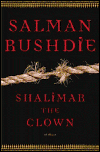
Shalimar the Clown by Salman Rushdie

The Beatles: The Biography by Howard Spitz. It seems this one is going to take a while. Biographer Spitz exceeds his quota of adjectives by the time we reach page 10.
recent reads.
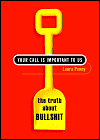
Your Call Is Important To Us by Laura Penny (review coming soon).

The Forest for the Trees: An Editor's Advice to Writers by Besty Lerner (rating 8/10). Lerner is a fine writer, and this was an enjoyable read. She tells stories on a lot of writers she has worked with, but without mentioning their names so we get to enjoy their foibles without that sense of reading a book full of gossip. I had hoped for was more practical advice: how to start on the road to getting an agent (who do I call or write to or see?), how might I start putting together a portfolio, if I have a few publication credits and no formal training what should I do next, stuff like that. These things were, I think, beyond the scope of the book but I'm sure she could have included them. With her skills, I'm sure she would still have produced a wonderfully compelling book.

The Memory of Old Jack by Wendell Berry (rating: 8/10) there's something about his storytelling, something in the tone he takes as narrator that I find too 'present.' I was conscious of his presence in the story. That in itself is not a bad thing, the guy can write after all and the story was a good one too. The problem (though a minor one) wasn't that Berry seemed to have put himself in the book but that he seemed to be trying not to. Because of this seeming ambivalence of his it felt at times as if Old Jack was a book that just misses being a sermon. I like good sermons and I like good books. Book length, book form sermons are okay too. I just wish this one had decided to be one or the other.
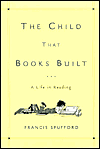
The Child That Books Built by Francis Spufford (rating: 7/10). It's a memoir about how books shaped Spufford's young life. It ends abruptly as he is about to enter adulthood which is where I think the story would have become a lot more interesting. Spufford says it's none of our business. Obviously, he doesn't know what a writer does. That's a rather large criticism of an author who clearly knows how to craft a sentence, but sentence-craft does not a writer make. The ability to put yourself out there is a must, and Spufford doesn't display that, not in this book anyway.
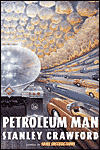
Petroleum Man by Stanley Crawford (8/10). The biography of the most self absorbed rich guy on the planet, Leon Tuggs. His aspiration is to own everything but he is empty. Crawford writes the entire thing in Tuggs voice, each chapter is ostensibly about a model car he gives to his grandchildren, but is in reality a mini sermon on the glories of wealth. Leon Tuggs is a very lonely man. To Crawford's credit, he lets us know this without allowing Tuggs to discover it himself. Brilliantly written and funny. Uber Capitalists probably should not read this book, mostly because they'll think it's an instruction manual.
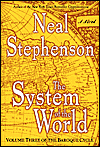
The System of the World by Neal Stephenson. (rating 9.5/10)Stephenson loves to write long, immensely complex, brilliantly conceived and researched historical fiction novels. The baroque cycle comprises three, no make that four such novels. There are three volumes but the middle one, The Confusion, is actually two novels which are sewn together, con-fused. This final book is a wonder to read. The amount of work involved, not only in terms of crafting a story and writing it down, but in researching the situations Stephenson creates simply staggers the mind. There are sentences in the book that must have required months to be able to knowledgeably write down.
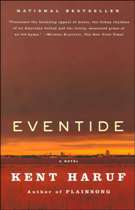
Eventide by Kent Haruf. (rating: 9/10) Any book that earns 9 out of a possible 10 has to be very good, though I had hoped that maybe Haruf would earn the highest score with this sequel to Plainsong (reviewed below). Eventide is a great book and highly recommended, but it's also kind of depressing. Haruf has said that the title is a clue to the approaching darkness we see in the narrative. It's not that I mind brooding fiction, I sort of like it in fact. But I don't know... I hoped for a little more, well, hope. It is there, but you have to look for it which is, I suppose, a lot like our real lives. And Haruf's charcters are nothing if not intensely and unforgettably real. This book is another must read, I just hope Haruf visits some of these people again.

Bitteroot Landing by Sheri Reynolds (Rating: 5/10) There are raves on the back jacket but this is a weak book. Reynolds' later "Rapture of Canaan" is terrific. This is, well, not. I almost gave up a third of the way through, but then something interesting happens. The story, about a girl growing up through unbelievably harsh treatment, is not really plausible. Reynolds seems haunted by faith and she gives this same longing to all her chracters. It would be interesting to see her write a character who is completely uninterested in spiritual things. Ignore this book and read "The Rapture of Canaan" instead.

Plainsong by Kent Haruf. (10 out of 10) Beautiful story simply and elegantly told about various residents of Holt, Colorado. Moments of beauty and pathos mix with laugh out loud humor. A great book. Not a misspent word in this one.

The Optimist's Daughter by Eudora Welty (rating:7/10). A not very gripping novel about a woman who copes with an identity crisis following her father's death. Welty doesn't seem to know what to do with her character, Laurel. Fay, however, the sniveling, selfish stepmother, she nails cold. Fay is one of those characters you just love to hate. Unless of course, you are just like her in which case you'll likely be vaguely embarrassed. An okay novel if you've got time for it.
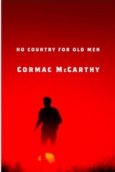
No Country For Old Men by Cormac Mccarthy. (9.5/10) Not only could I not put this novel down, I could barely stand to take my eyes from the page. No Country grabs you by the throat, shakes you like a rag doll for three hundred pages and leaves you exhausted. I loved it. McCarthy's prose is at once spare and detailed in this brutal story of a killer, a hunter, and the sheriff who always arrives too late. A meditation on the frustration of aging in an ever spiraling moral universe. Not for the timid.
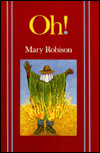
Oh! by Mary Robison (6/10). Another well written book with unappealing characters doing unappealing things to each other and themselves. If you like that sort of thing, this is just your cup of tea, or gin as it were. Everyone in this book drinks too excess, except Violet, the daughter of the main character. The cover illustrates a scene in the book. It is brief and almost the only excitement in the story. Mary Robison sure can write, I just wish she had found better things to write about. She eventually did, read this book instead.

Duane's Depressed by Larry McMurtry (9/10). What a difference from the earlier two books in the "Last Picture Show" trilogy! This book isn't about sex, for one thing. To be fair the other two weren't about sex either, but they seemed to be. This time we walk into and through depression with Duane. Though McMurtry famously excels at getting into the heads of his female characters, and it's as true here as in his other books, this time he rigourously captures the feeling of a man's depression, ground which I know well enough and which I don't care to tread again anytime soon, God willing. I didn't mind walking it with Duane and with Mr McMurtry, though. I didn't mind at all.

Gilead by Marilynne Robinson (rating 9.5/10). This novel is so good I was looking forward to giving it a 10 out of 10. However, about three fourths of the way through, Robinson felt compelled to give us an extended narrative from a major character other than the protaganist. Since the novel is intended as a letter from the dying John Ames to his son, the extended monologue, presented as a quotation from another character, shifts the voice of the novel and its point of view, doing damage, I believe, to an otherwise faultless narrative. That was a disappointment. But the rest of the book is so vivid, so plainly beautiful, so... perfect that it easily earns a place among the great works of American literature. No kidding. If you haven't read it, put aside everything else and find a balm in Gilead.

The Body Artist by Don Delillo (rating 8/10). Not long ago I read Delillo's "White Noise" and thought it was excellent. So, true to my nature I went out and bought two more of his books, this one, and "Underworld," which I'll get to sometime. Body Artist was simultaneously excellent and disappointing. Delillo's a confident writer. Perhaps too confident. I'm of the opinion that writing well is a truly selfless act (something I'll have to post on at some point). Delillo's prose is not selfless, at least in this book; this is not true of "White Noise." I believe he was aware of every word he was writing, consciously constructing the story instead of letting his characters live it. The book is essentially a ghost story, but not really. There is a surprise pretty early on that you never get over, which I think is the point. I liked that. I also enjoyed that the name of the protaganist doesn't appear until about page 50, since the structure of the story doesn't really allow it to appear earlier; that's one way in which Delillo's (over)confidence serves the story. You can't say he doesn't know what he's doing.
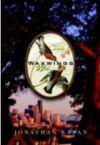
Waxwings by Jonathan Raban(rating: 8/10) The reason I give this expertly written novel the equivalent of a "B"? The story is engrossing, but we're almost a third of the way through before we find out that Thomas Janeway is the main character and even farther down the road before we discover a major plot line. Furthermore, the book ends too soon. We want to know what happens to Thomas and to his wife beyond the final page. It is almost as if Raban wrote 80 pages of backstory and included them in the novel, but couldn't be bothered with the ending. He's still a wonderful storyteller, however. A subplot regarding Chick, a stowaway chinese who narrowly escapes discovery and eventually enters Thomas Janeway's life, told entirely from Chick's point of view, is particularly engaging. It is a sign of Raban's narrative gifts that he manages to evoke sympathy for his protaganist despite that character's shambling and dangerous self-absorption.
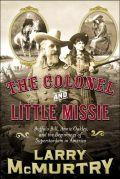
The Colonel and Little Missie (rating: 9/10) Reading McMurtry, I often get the feeling that he's sitting with my telling the story, that I'm not reading a book but listening to him. His voice sounds a lot like my own. I think that's what makes him such a great writer. He has a way of saying things that are definitely his opinions and insights, but you "hear" them in your own voice. I don't know if that makes any sense, but this book does. I love the plainspoken way he tells the story of Buffalo Bill and Annie Oakley, simultaneously demythologizing (his specialty) and heroicizing both of them. As usual, McMurtry finds ways here and there of tying the story to his own experience. This book is an achievement, and not his first either.

Texasville (rating 7/10). McMurtry treading his far too typical thematic landscape, sex. In Texasville, everybody sleeps with pretty much everybody else. If he weren't such a wonderful writer I would have thrown this book across the room. The main character suffers from a frustrating emotional myopia. The other adult characters are all jerks. If I were Duane, the 'hero' of the book, I would have told them all to take a flying leap. Still, McMurtry is the master of diaglogue. He's worth reading for his ear alone. There is not a single stilted conversation rendered in the book. Of course, you can read almost any McMurtry book to get realistic dialogue, you don't have to put up with this one.

The Winemaker's Daughter (rating:6/10)

The Confusion (rating 9/10)

The Noonday Demon (rating 8.5/10)
Subscribe to:
Comments (Atom)
